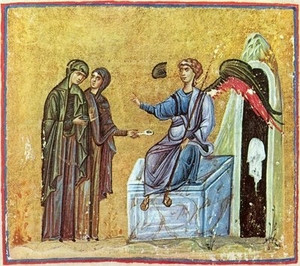|
From 'Orthodoxy and the World' www.pravmir.com Feasts. Calendar Source: Orthodox Word
Then, those of you (faithful women) who come to church and pray to the Lord here (in the church) and in your home, if you pray attentively with love, humility and perseverance, will always receive help from God and you will be comforted in your troubles.
As we’ve talked today about the Sunday of the Holy Myrrhbearing women, do not forget that all of you Orthodox Christian women and your daughters are called to be the Holy Myrrhbearing women of the Orthodox Church today and forever.
The younger girls and daughters can bring mirth to our Lord Jesus Christ their clean life, their virginity, prayer and obedience to thier parents. All (college) students and young women, who come to church regularly, can also bring to Christ our Saviour their mirth of good fragrance: the zeal for good deeds, mercy and charity towards those in suffering and obedience to their spiritual father.
The Christian mothers bring to our Master their most precious mirth: that is the birth, raising and education of children in the fear of God. And also the older mothers, grandmothers and widows, that are always present in the holy churches of God, will bring (to our Lord) their ointment of tears and prayers as they piously keep the Orthodox faith and legacy passed out by our ancestors.
Behold, all the daughters of the Orthodox Church today, you are the offspring of these Holy Myrrhbearing women from the time of Christ – when you hold in your heart the good fragrance of faith, prayer and Christian love. If you’ll only run with devotion to church along with your children, as the Holy Myrrhbearing women once ran to the Tomb of Christ.
About the Holy Myrrhbearing women I can also tell you that there were times in the life of our Saviour Jesus Christ, when they were more courageous than the Apostles. For instance, when our Lord was taken-up by the Jews in the Garden of Gethsemane, all the Apostles – with the exception of St. John the Evangelist – left Him, and Peter betrayed Him by swearing three times that he does not know Him. But the women followed Him from afar, both to the council (of Pilate) and on the road to Calvary. They accompanied Him when He fell under the heaviness of Thy Cross, and Veronica with her veil wiped his tears, and her veil became the first icon bearing the image of Christ.
All these holy women witnessed His beating, His nailing and His crucifixion (among the two thieves), they have heard the last words of our Saviour and wept bitterly when He gave His last breath saying „It is done!”
After the crucifixion of Jesus, when the Apostles were hidden for fear of the Jews, these women, in that very early morning approached the Holy Sepulchre (Tomb) to anoint our Lord’s body, as it was customary in the Hebrew tradition. And just when they reached the tomb seeking our Lord’s body, they found it opened and empty and, an angel of the Lord announced them that „Christ had rose from the dead”, and showed them the empty shroud.
Mary of Magdalene, this brave women that Jesus exorcised seven demons out of her, becomes the greatest witnesses of Christ’ Resurrection; she remained weeping at the grave, while other women had left. She was still seeking for our Lord’s body, but the tomb was empty. Then she met someone at the grave and thought to be the gardener. That’s why she asked: “Sir, if you have carried Him away, tell me where you have laid Him, and I will take Him away.” (John 20, 15).
Then „the gardener”, Christ Himself, called her by the name: Mary! His emphasis and tone of voice, made Mary recognize HIM. Although Jesus Christ was the same in flesh and blood, as He revealed Himself later to the Apostles, there was something changed in Him. It was undoubtedly His divine appearance, His transfigured flesh. Thus, He was only recognized by those with a truly pure heart that had their eyes enlightened.
When Mary recognized Him, she sought to approach Him. But Jesus said: „Do not hold me, for I have not yet ascended to the Father; but go to my brethren and say to them, I am ascending to my Father and your Father, to my God and your God.” (John 20, 17).
Not long after this event, our Saviour appeared to His disciples in Galilee, on Mount Eleon. There Jesus was to meet with His Apostles gathered at one’s house.
So we see that these holy women were in company of the Risen Christ – Who appeared from time to time, in order to get them all used with his resurrected body, because it was a great miracle, since no one had seen a resurrected body before. (…)
During these forty days, He entrusted the Apostles and the Myrrhbearing women by appearing to them and to hundreds other people.
Christ’ Resurrection is a guarantee of our resurrection, for as Jesus Christ rose from the dead, as St. Paul says, we will also rise (…) and we’ll stand before the judgment seat of Christ with all our good or evil deeds, and we’ll be spending eternity accounting the way we led our lives in this world.
(Excerpt from “Elder Sofian’ spiritual conversations” translation by EC)
You might also like: The Myrrh-Bearing Women: Sacrificial Love by Archimandrite Kirill Pavlov
Sermon on the Sunday of the Myrrh-Bearers by Fr. Sergei Sveshnikov
© Copyright 2004 by 'Orthodoxy and the World' www.pravmir.com |
